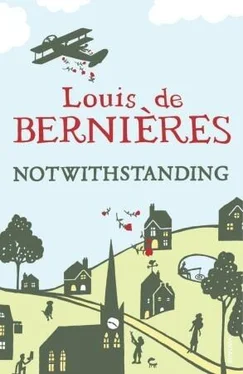Louis de Bernieres - Notwithstanding - Stories from an English Village
Здесь есть возможность читать онлайн «Louis de Bernieres - Notwithstanding - Stories from an English Village» весь текст электронной книги совершенно бесплатно (целиком полную версию без сокращений). В некоторых случаях можно слушать аудио, скачать через торрент в формате fb2 и присутствует краткое содержание. Год выпуска: 2010, Издательство: Vintage, Жанр: Современная проза, на английском языке. Описание произведения, (предисловие) а так же отзывы посетителей доступны на портале библиотеки ЛибКат.
- Название:Notwithstanding: Stories from an English Village
- Автор:
- Издательство:Vintage
- Жанр:
- Год:2010
- ISBN:нет данных
- Рейтинг книги:4 / 5. Голосов: 1
-
Избранное:Добавить в избранное
- Отзывы:
-
Ваша оценка:
- 80
- 1
- 2
- 3
- 4
- 5
Notwithstanding: Stories from an English Village: краткое содержание, описание и аннотация
Предлагаем к чтению аннотацию, описание, краткое содержание или предисловие (зависит от того, что написал сам автор книги «Notwithstanding: Stories from an English Village»). Если вы не нашли необходимую информацию о книге — напишите в комментариях, мы постараемся отыскать её.
is a funny and moving depiction of a charming vanished England.
Notwithstanding: Stories from an English Village — читать онлайн бесплатно полную книгу (весь текст) целиком
Ниже представлен текст книги, разбитый по страницам. Система сохранения места последней прочитанной страницы, позволяет с удобством читать онлайн бесплатно книгу «Notwithstanding: Stories from an English Village», без необходимости каждый раз заново искать на чём Вы остановились. Поставьте закладку, и сможете в любой момент перейти на страницу, на которой закончили чтение.
Интервал:
Закладка:
‘I’ve got to catch a pike, mister,’ Robert told him, adding, ‘I’ve got to catch it for a lady.’
‘How are you going to catch it, sir?’ asked Mr Horne, playing up to the boy’s earnestness.
‘Live bait,’ said Robert.
‘Well, then, sir, you’ll need a Jardine snap tackle and a trace.’ He reached under the counter and brought them out, neatly coiled inside cellophane packages. ‘Have you got a bung?’
‘I found one in the Wey, mister.’
‘How about the rod? Is yours up to it?’
‘No, mister, but I can’t buy another one. I ain’t got the money.’
‘That’s a shame. Do you know what you’re going to do?’
‘Yes, mister. I got a plan. I need some line, though.’
‘Is it a big pike, young sir?’
‘It’s the Girt Pike.’
‘The Girt Pike,’ repeated Mr Horne, unenlightened. ‘Well, if it’s the Girt Pike …’ He handed over a fifty-yard reel of thirty-pound line, and said, ‘This’ll hold anything short of a shark.’
Robert felt the hefty monofilament with his fingers. It was thicker and more stiff than any line he had ever seen before. Mr Horne observed his apprehension and told him, ‘Use the half-blood knot as usual, but wet the line first, or it’ll be hard to draw tight.’
Robert counted out his money and realised that he was sixpence short. He stared at the coins in his palm, the threepenny bits and the halfpennies, and felt the leaden weight of disappointment in his heart. He looked and looked at his coins, as if looking might conjure up the extra coin that he had to have. Tears came to his eyes, but he mastered them, and slowly he offered back the brown paper bag containing his purchases. ‘I ain’t got enough,’ he said.
Mr C. F. Horne looked down at him sympathetically, and then he had a brainwave. ‘Let me look at those coins,’ he said, and he took them, turning them over in his hand with a scholarly air. ‘Ah!’ he exclaimed theatrically. ‘Just as I thought!’
He held out a blackened old penny that bore the all but deleted image of Queen Victoria. ‘See this, young sir? This penny is very rare. In fact, it’s so rare that it’s not even worth a penny.’
‘Isn’t it?’ said Robert, fearing that it was so worn out that its value might have been reduced to a halfpenny.
‘As luck would have it,’ said Mr Horne gravely, ‘this penny is so rare that it’s worth sixpence, and sixpence is exactly what you owe me.’ He handed back the brown paper bag, saying, ‘Thank you kindly, and good luck with the, er, Girt Pike. And don’t go putting your fingers in its maw until you’re sure that it’s dead.’ He watched Robert leaving the shop, and sighed and shook his head on account of his own foolishness. For months afterwards, Robert was to wonder somewhat ungraciously whether his penny might have been worth even more than sixpence, and half suspected Mr C. F. Horne of having diddled him.
The following day Robert took a small bowsaw from his father’s shed, and went to the Hurst. It was dark, wet, criss-crossed with inexplicable ditches, and in some places it had been coppiced for centuries. One of the ditches was oozing with the old engine oil emptied into it routinely by the gypsies at the scrapyard, but in those days no one thought anything of it. It was a place of kingcups and bluebells, pheasants, and abandoned iron pans with the bottoms rusted out. Through it ran the old cart track that in former times had been the main road to Chiddingfold and Abbot’s Notwithstanding. Nothing ever grew on it, and it remained a ghost road, or perhaps a road-in-waiting. He soon found a hazel that was in the ideal state, because he had often thought that one day such a wand might come in handy for something.
Not far off, Polly Wantage, apparelled in plus fours, was banging away at squirrels with her twelve-bore, and Robert worked quickly, with the fear in his breast that she might mistake him for a squirrel and give him a peppering. He whistled out of tune, very loudly, so that she would know he was a boy. His Uncle Dick frequently claimed to have been shot up the backside by irate gamekeepers, and liked to tell Robert that every evening he found lead shot in his underwear, where it had worked its way out of his bum during the day. He would put a hand down into the seat of his trousers, draw it out, and present the boy with pieces of warm swan shot, exclaiming, ‘There you are, son, get a load a’ that! Just think where that’s been, eh! Makes yer wince, don’ it?’
The holy grail and ultimate ambition of every little fisherman was a twelve-foot fishing rod. One day Robert hoped to own the very best, a Sealey Octofloat, which was made with real split cane, and was a proper twelve-footer. Twelve foot was long enough to reach out beyond the lily pads at the fringes of ponds, it was long enough to drop a float delicately next to the bubbles being sent to the surface by a tench, it was long enough to feel like a grown-up’s weapon. Never mind if it was also long enough to get tangled in the branches overhead during lapses of concentration and periods of excitement. Robert cut a long hazel pole that looked as if it must be at least twelve foot, and pulled it out of the clump where he had found it. Rather self-consciously he walked back home with it, past the green and the village shop, and past Obadiah Oak, the village’s last peasant, who made no acknowledgement beyond a friendly nod of the head, conscious that little boys often need long sticks for all sorts of purposes. Robert was worried that it might have been illegal to cut sticks in the Hurst, and his heart thumped with anxiety until he had arrived safely home, in case he was passed by the bobby on his bicycle, who would probably know straight away that the stick was a stolen one.
When he was home, Robert managed to get the pole through the house and out into the back garden with the assistance of his mother, who held on to the thin end to make sure that it didn’t whip any ornaments off their shelves. When he had laid it out on the grass he fetched a tape measure, and, with mounting excitement, confirmed that his rod was indeed not just twelve foot long, but sixteen. What should he do? All the best rods were twelve foot, but why not innovate, why not go even further? He wedged the rod into a chink in the fence, and bent it at the tip. It was definitely too thin and weak, so he cut off two feet. He waved the rod about, feeling it flex, and it was just right. He knew instinctively that it had enough whip in it to resist and tire a big fish, bending without breaking. Robert realised that he was pioneering a new concept in extra-long rods, and he felt emboldened and excited.
The little boy whipped the end of the thirty-pound line on to the tip, carefully emulating the technique taught him by his grandfather. He tied a loop in his line and tightened it about an inch from the point of the rod, and then very neatly he bound it along the final inch with button thread, under which he had laid a short loop of fine line, so that he could pass the thread through the loop, and then pull it through under the binding, to fix it. This always worked better than knots. Robert waited impatiently until his mother went out to the village shop to get bread, and then he sneaked upstairs and raided her make-up table for clear nail varnish. He painted it heavily on to the whipped thread, enjoying the clinging, intoxicating odour of it, so that it would shrink the whipping tight and set it hard and solid.
Robert had enough experience to realise that the line couldn’t be much longer than the rod, because otherwise he wouldn’t be able to land the fish, and so he cut it off at fifteen feet, reasoning that this left some compensating margin for the line that in the future he was bound to lose while cutting knots away from hooks and traces. He rootled around in his treasure drawer and found the brightly painted pike bung that he had once rescued at great peril after spotting it abandoned, tangled up in reeds on the River Wey after the great flood. He pulled the stick out of the middle, laid his line in the slot, and replaced the stick. He resisted the temptation to tie on the trace and the treble hooks of the snap tackle. He had had a hook in his finger before, because of leaving his rod tackled up and ready to go. Uncle Dick had brought the hook through his flesh until it emerged, then he had cut off the barb and drawn it back out. The memory of the agony he had had to endure still made him clench his teeth.
Читать дальшеИнтервал:
Закладка:
Похожие книги на «Notwithstanding: Stories from an English Village»
Представляем Вашему вниманию похожие книги на «Notwithstanding: Stories from an English Village» списком для выбора. Мы отобрали схожую по названию и смыслу литературу в надежде предоставить читателям больше вариантов отыскать новые, интересные, ещё непрочитанные произведения.
Обсуждение, отзывы о книге «Notwithstanding: Stories from an English Village» и просто собственные мнения читателей. Оставьте ваши комментарии, напишите, что Вы думаете о произведении, его смысле или главных героях. Укажите что конкретно понравилось, а что нет, и почему Вы так считаете.












